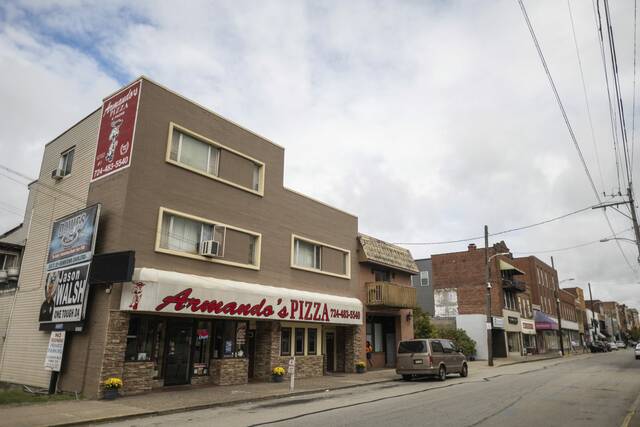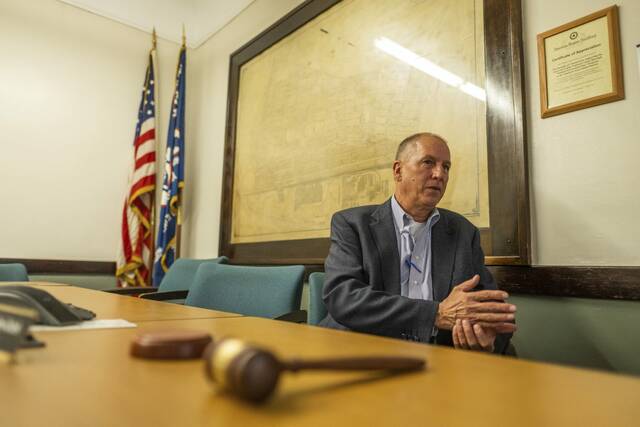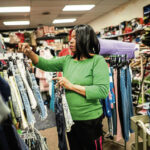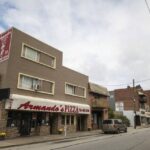As the political spotlight shines on Charleroi, a Mon Valley town settled by immigrants and named after a city in Belgium, its residents are disputing Donald Trump’s portrayal of its burgeoning Haitian population.
Haitian Marie Occimable lived in Miami and Atlanta, then heard Charleroi could be a place where she could open her business, which sells clothing, shoes and a variety of items.
For the past four years, the community has offered a safe place to live and earn a living, Occimable said.
“It’s been a good place,” Occimable, 68, said inside her store along Fallowfield Avenue in the middle of the town’s once-bustling business district.
Occimable said she does not know much about the criticism Republican presidential candidate Donald Trump leveled against the Haitian immigrant community in Charleroi when he claimed in a campaign speech that they have caused problems for the borough and Charleroi Area School District.
It’s a claim community leaders and school officials are pushing back against.
“We don’t have any problems (from Haitian immigrants). There is the perception that there would be, then there’s the reality,” said Joe Manning, manager of the Mon Valley borough. He has fielded inquiries from the national news media, as well as the BBC in England and a German television station.
“There’s no discernible increase in crime and no discernible impact on our resources,” Manning said.
“Of its typical call volume for the police department, maybe 15% is from that (Haitian) community,” said Chad Zelinsky, chief of the Charleroi Regional Police Department, which covers Charleroi, North Charleroi and Speers. Only a few of the 11 accidents reported this month have been from Haitian drivers, he noted.
Trump claimed there was a 2,000% increase in Haitian immigrants in Charleroi since President Joe Biden took office in January 2021. Trump also claimed the influx of Haitian immigrants has left the borough — with a $3 million budget — virtually bankrupt.
“That’s a complete fabrication,” said Manning, a former City of Washington firefighter who has been borough manager since April.
‘Divisive rhetoric’
Borough council President Kristin Hopkins-Calcek, a registered Democrat, took Trump to task for his comments about the Haitian community in Charleroi.
“Trump chose to exploit our town for political purposes, using divisive rhetoric to unfairly target the Haitian immigrant community,” Hopkins-Calcek said in a statement.
“They looked at the fact that Haitians are living here and they exploited that,” Manning said of the Trump campaign, which also has attacked immigrants from Mexico.
Hopkins said Charleroi is a borough steeped in a rich history of immigration from European countries who sought freedom and happiness.
“Yet, unlike their predecessors, they’ve faced a markedly less-welcoming reception. Haitian immigrants have been unfairly scapegoated for many of Charleroi’s problems,” Hopkins-Calcek said.
Trump’s comments have put Haitians in danger of being attacked, said Edward Larson, executive director of Haiti Friends, a Pittsburgh-based support agency for Haitians in the region.
“It is never positive to sow the seeds of division and hate,” Hopkins-Calcek said following a meeting Wednesday of the Charleroi Regional Police board.
The former president’s comments have not caused the kind of backlash against the Washington County community that has occurred in Springfield, Ohio. Trump claimed the town was being destroyed by Haitians who are eating people’s pets, something that has been refuted by Springfield officials, residents and multiple media fact-checkers
“We’re grateful we haven’t seen the problems that are going on in Springfield,” said Manning, referring to the bomb threats the community has experienced since Trump’s campaign speech. Manning said he has been in contact with Springfield’s city manager, Bryan Heck, on how they are dealing with the aftermath of Trump’s comments.
Why Charleroi?
The question some in the community have asked is how the Haitian immigrants came to Charleroi.
Word of mouth spread among the Haitian people that Charleroi was a good place to live, with affordable housing and factories offering jobs, Larson said.
“They felt it was a safe community and a good place for their children to attend school,” Manning said.
The political unrest in Haiti was a big reason people wanted to leave their native country, Larson said.
“They were trying to escape the gang violence,” Manning said.
They also saw business opportunities where there were empty storefronts along Fallowfield and McKean avenues in the town’s business district, he added.
In addition to Occimable’s boutique, there is Queen’s Market, which is stocked with food from Caribbean countries.
The impact of the pending closure of the Anchor Hocking Corp. glass plant, which makes Pyrex cookware, on the community has yet to be determined. It will result in the loss of some 300 jobs by the end of the year, putting Charleroi’s legacy as a glassmaking hub at risk, Hopkins-Calcek said. In addition to that plant, the closing of the Quality Pasta plant in the borough will mean another 80 jobs lost.
Churches have reached out to make the Haitian community welcome in Charleroi.
St. Andrew the Apostle Church operates a monthly food pantry that distributes about 130 bags of food a month to the needy, many of whom are Haitians, said the Rev. Levi Hartle.
A social worker operates out of space at the church to help the Haitians navigate the intricacies of government systems when they need assistance.
They are working to have a person able to translate the church bulletin and the Mass into Creole for those parishioners who need it, Hartle said. As these efforts develop, word of mouth likely will spread through the Haitian community that St. Andrew is a welcoming church and more families will attend Mass, Hartle said.
He sees it as an important mission of the church, where parishioners are making sacrifices for the whole community.
“St. Andrew has been working on a number of initiatives in order to make the Haitian community integral to the parish life,” Hartle said.
“The church remains committed to working alongside community partners to ensure that these families find stability, support and a sense of belonging during this transition,” Pittsburgh Catholic Diocese Bishop David Zubik said.
Education
The local school district has seen an influx of Haitian students in the last few years, said Charleroi Area Superintendent Edward Zelich, whose district has an enrollment of about 1,560.
Trump claimed the recent surge in Haitian immigrants has caused the district to spend hundreds of thousands of dollars to provide English teachers for the students. The district said it went from one English language learner teacher in the 2019-20 school year to four ELL teachers this year. The jump in enrollment also resulted in two more full-time kindergarten teachers being hired this year.
The ELL program includes students from more than 26 countries. There were just 12 ELL students in the 2019-20 school year, jumping to 175 last year and 225 students this year, the district said. The elementary grades have more than half — with 133 elementary students who are ELLs, the district said.
The additional Haitian students have created challenges in hiring ESL teachers because not many teachers understand Creole, said Edward Killiger, elementary principal and English as a Second Language coordinator.
Donald Martin, executive director of Washington-Fayette-Greene Intermediate Unit 1, said additional teachers are undergoing instruction to be certified as ESL teachers.
“It’s a been a great partnership. I think everyone (IU1 and Charleroi Area) has worked so well together,” Martin said.
What is even more challenging, Killiger said, is that while the parents speak Creole at home, the children, who have gone through Spanish-language countries en route to the United States, speak Spanish and in some cases Portuguese, depending on their migration route from Haiti.
“Creole is like Pittsburghese,” Zelich said.













